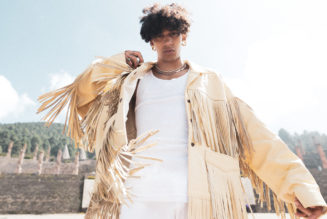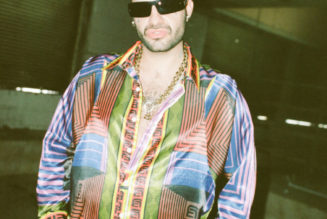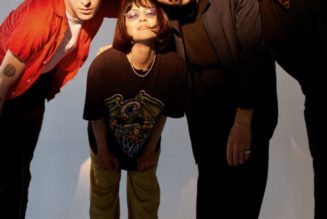Some of the greatest MCs represent the neighborhoods that molded them. Jay-Z and Nas have Brooklyn. Dr. Dre and Kendrick Lamar have Compton. But for 24-year-old non-binary rapper, Pink Navel, aka Devin Bailey, that city doesn’t exist, well, on the material plane. “I’ve always said that I’m from the internet more than any physical place,” Bailey says, fiddling with one of their dreads. And that’s certainly reflected in their music.
Bailey’s latest record, Epic, is a distinctly online project filled with a dizzying combination of TikTok samples, bars about YouTube and anime, and swirling beats that were produced for a live audience on Twitch.
Raised in the coastal town of Marshfield, Massachusetts, about 30 miles south of Boston, Bailey had a hard time finding a single city to call home. “I moved around a lot growing up and never really had a foothold in any specific place. I always felt like I had a sort of nomadic existence.” Bailey explains.
They don’t feel much of a connection to the sprawl they grew up in, and the same goes for the region that they became a musician in. Except Dunkin’ Donuts, they love Dunkin’. Quincy, Massachusetts’ claim to fame. “That’s probably the most New England thing about me, I’m a Dunkin’ Donuts rider, and I love that,” says Bailey. “We as a region are really all about it, and there’s a general understanding that the coffee is bad, but we’re all gonna love it anyway. I find that kinda poetic.”
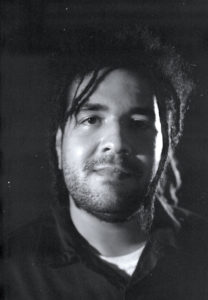
Even Bailey’s music genre of choice, hip-hop, is more a product of the internet than their surroundings. When they made their first serious foray into music in 2014, it was through the bustling DIY emo scene in Boston. They sang for the band Handwriting in high school, recording four albums and playing anywhere they could in New England. “We were gigging a lot. It was a great experience, I was leveling up, getting that XP up.” Bailey laughs, unable to keep their inner gamer at bay, using the abbreviation for experience.
It wasn’t until they found the likes of Dumbfounddead, Timothy Delaghetto and Knock Steady Live on YouTube, that they started to transition into their current genre.
In 2018, Bailey would don the moniker Pink Navel, an overt reference to the cartoon Steven Universe. The animated series tracked the coming-of-age story of the titular character. Steven is part human and part Gem, an alien race, and along with other Crystal Gems, is tasked with protecting humanity from various threats. Through Steven’s various adventures and episodes of self-discovery, the show prominently featured LGBTQIA themes and messages of acceptance. “That show is really what helped me realize what kind of person I am. Those stories really helped me come out as non-binary, and I want to dedicate my work to that show.”
The transition from emo frontperson to loud-and-proud meme rapper would not come without growing pains, which Bailey waxes about on Epic: “Quick gigs with kids who never knew how DOOM had felt.” Their earliest shows were booked through connections that they made during their emo days which proved difficult to sell. Often playing barely 10-minute sets, Bailey was sorely underappreciated. “I was once asked to drive four hours for a 15-minute set. So many of those people tried to book me as a diversity act without giving me an actual platform”
During this decidedly discouraging phase, Bailey was able to maintain a relationship with their favorite rapper, the legendary R.A.P. Ferreira, who they met in 2013 on his first tour to Boston. “He was super graceful, and always super sweet to me,” Bailey says. “He proved to me that hip-hop was something that I could do as this weird, out-there person. Up until then, I had always thought I’d have to be this punk or emo frontman.” Another pivotal step in Pink Navel’s journey was made possible by the internet.
In 2018, Ferreira asked Bailey to join his Maine-based collective Ruby Yacht. They dropped out of college and were enveloped into a respected fold of underground hip-hop that has turned into their family. “Being a part of this crew completely changed my life and outlook and work ethic, and pretty much everything about me for the better. I started rapping to get into Ruby Yacht, and I did.” Bailey grins.
Epic was recorded live and streamed for fans in the basement of SPACE, a non-profit gallery in Portland, Maine. “I didn’t want to do multiple takes. I just wanted to do it and just let it be how it is. I’m so used to spending a whole year or more on a project and banking on that, so I really wanted to switch up the formula.”
This recording process was a direct extension of Bailey’s livestreams on Twitch: intimate online hangouts where they made beats, freestyled and interacted with their fans through the chat and by taking actual phone calls.
“I like the internet, but Devin loves the internet. Like I’ve never seen anyone that loves the internet as much as him.” SB the Moor, Pink Navel’s Ruby Yacht peer, laughs.
The live recording heightened the already endearing effect of Bailey’s fluid and dynamic style of rapping. “Devin has always had such a warm, heartfelt, and nostalgic sound,” Moor says. “And I really think that’s present on Epic.”
There are blemishes in the recording, moments where the beat drowns out the vocals, and Bailey does stumble on a line here and there, but those reminders of the project’s humanity are special.
The lyrical material of the album reflects its online birthplace and is chock full of references to niche cartoon characters, memes and YouTube personalities. “My goal is to blow two peoples’ minds. Those references might go over most peoples’ heads, but a few random people are going to be like ‘Woah, I can’t believe you rapped about that.’”
The track, “Ze Frank,” is dedicated to their favorite YouTubers. “I am the only rapper who knows Ze Frank,” Bailey raps and then proceeds to give nods towards other beloved icons of the platform, like Phillip DeFranco and Wheezy Waiter. Names that I would never expect to hear in a rap song. Bailey beams when I tell them this. “That’s what it’s all about,” they nod enthusiastically.
On “Grateful Bard,” Bailey relates themself to the infamous kid who couldn’t pronounce “dedicate” in a clip from a Minecon Q&A. “The confidence that that kid had to ask, that is more confidence than I have ever had. He knows how he talks and sounds and looks, but he’s already so past that. He doesn’t give a shit about what anybody’s gonna say, and that’s fly to me.” Bailey says.
These references are interwoven effortlessly with Bailey’s personal experiences, their past, their place in the Ruby Yacht family, and their future.

Bailey moves from topic to topic with dizzying quickness, but they do it with purpose. On the track “R U Bashful,” an homage to their mentor R.A.P. Ferreira, they rap, “My favorite rapper said the best ones are not cohesive thematically.” And on “Soulfolks Bounce” they boast, “I’m that cartoon fanatical sporadically associating things into a song.”
“No brain is cohesive,” Bailey explains to me. “When you’re a rapper, it’s a lot about the person that you are, and not like your songwriting ability or a structured piece that’s very tight, you know? I feel like the best rappers are all over the place.”
That approach can be difficult to crack, and on first listen some of Bailey’s lyrics can be head-scratch-inducing. Instead of limiting their scope, Bailey lays out chunks of their subconscious in all of its complexity. They link technology with the human soul on “Tiguan” with a story about the Bluetooth connection in their car that always tries to connect with its past owner. On other tracks, questions of identity and self mingle with anime and YouTube.
In their world, cartoons, TikToks and memes, so often considered mindless drivel, are food for the soul, windows into self-discovery. Pink Navel is at once a kid at home donning a Darth Vader mask, messing around in their grandma’s basement, and at the same time a fully-fledged adult attempting to solidify their identity. They routinely grapple with the past and then quickly move into how that has created the person that is rapping now.
“With this project I’m really trying to bridge the gap between me now and me back then. I wanted to straight out be, ‘I am the kid that I was, still,’” they tell me.
Epic’s first track, “XJ-9,” is a great taste of how these dynamics play out. The title is the name of a ship from the cartoon My Life as a Teenage Robot, which Bailey traces back to their childhood. “In my brain, the first time I heard the phrase ‘stops on a dime’ was from an episode of that show I saw as a kid, and I remember being like ‘what the hell does that mean?’” Bailey explains.
That innocent and whimsical moment is contrasted starkly with a mantra which Pink Navel shouts as the song ends: “Dear God, I-I hate to be a tattletale but / Uh, the white man is killing again.” It’s a line that Bailey explains they pulled from their father’s old diary almost a decade after he passed.
That dark bar, written decades ago by Bailey’s father, rapped with almost a chuckle, and set against a backdrop of innocent childhood cartoons is a prime example of how Bailey processes their lived experience. As a young, Black and queer person they immerse themselves in otherworldy stories in search of a sense of place in a world that has proved it can be unforgiveably violent. It links a troubled past with a troubled future and a lost father with his son.
“He wrote that in 1993 or 1994,” Bailey laughs, “Little does he know, 25 years later the white man is killing yet again.”
And it’s clear that they’ve found that place.
On the next track “DIY Twitter,” Bailey pronounces, “I’m Black, Blackity Black, weird as hell too.” They embrace their nerdiness and their blackness in one line. And throughout the album are nods to their non-binary gender identity. With the bar, “You are amazed at how I rap this way with fluid gender” — delivered with Kanye-level confidence — Bailey laughs at those in hip-hop that are uncomfortable with their presentation.
“When people think of queer rappers, people put them in a box, that they can only do certain types of rap music, and I think that’s just as fucked up as telling them they can’t rap,” they emphatically states.
That confidence doesn’t mean they’re out of the woods yet, though. On “Ze Frank,” Pink Navel makes a nod to Etika, the late black YouTuber who died by suicide after a series of mental breaks brought on by a barrage of online harassment from commenters. They rap: “With my deepest respects say rest peacefully Etika / Being black while liking this stuff it ain’t too easy.”
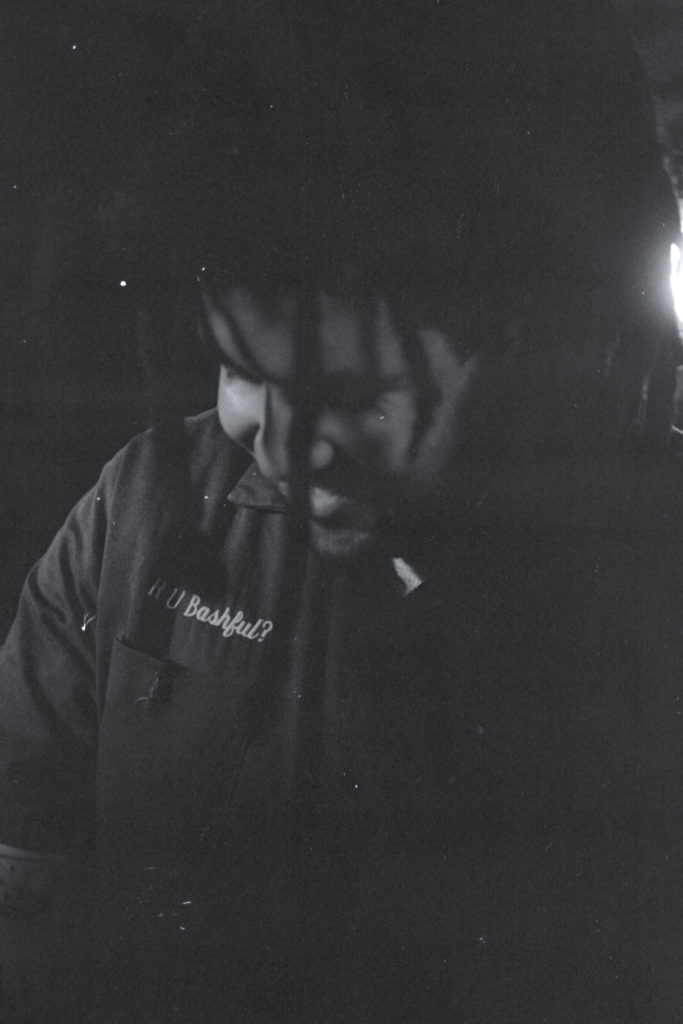
But it’s clear that Pink Navel is still looking towards the future. Their album opens with them declaring, “My final evolution is a super boring person with a hurting to go bald and rock my Dad’s cap.” And on “Gazebo Raps,” they rhyme about their mother building a gazebo and ponder how nice it will be to finally own one themselves.
“An Invocation for Beginnings” is a performance of a monologue that was originally written and created by Ze Frank. They invoke the FILI or Fuck It Let’s Do It index, and urge themselves to resist their “cheese monster” — a monster that “will never be satisfied by cheddar, only the cheese of accomplishment.” It’s the kind of silly line that Pink Navel is so great at delivering, it almost feels like one of their own, and is a perfect encapsulation of their mindset going into the album.
It’s clear that Pink Navel had to overcome a lot to become the person that we hear on Epic, a person that is still working on themselves, but has ultimately accepted who they are and has found a home in the strange world of the internet. It is that journey, the highs and lows, the 25 years that it traverses, and the sheer accomplishment of performing it all live that makes Epic, well, so epic.
Bailey tells me, “I really want to reclaim epic as a legitimate term. In the modern lexicon, ‘epic’ is a word that’s used facetiously, and I was like, ‘This needs to stop,’ I really want it to be brought back to the classic usage.”
With the album Epic, Bailey has shown that they are completely of, and dedicated to, the internet, and that doesn’t have to be a bad thing. They have proven that this thing that can be so easily demonized for the hate that burbles in its underbelly and can also be a tool to fully communicate what is in the soul.




